A leaked document written by West Coast Health proposed urgent primary and after-hour services will no longer be offered by doctors and nurses for the entire West Coast.
The document was marked “Confidential for Whatu Ora staff only” and will impact from Karamea in the north to Haast in the south.
West Coast Health, the primary health organisation which services the West Coast, said, “High workloads and recruitment issues are impacting on West Coast primary care practices’ ability to staff weekend clinics”.
West Coast Health said clinicians could no longer work weekends or after-hours after having worked a full-time shift and the practices were under financial strain because of inadequate funding and the capitation funding formula.
“The closing of urgent primary care and after-hours health services on the West Coast will have dire consequences for the people of the West Coast. The isolated region has an older population with higher health needs with less access to cellphonea and the internet. It’s a recipe for disaster,” Patient Voice Aotearoa chair Malcolm Mulholland said.
Telecare plan for area with iffy internet
West Coast practices are proposed to be enrolled with Ka Ora Telecare National Rural Telehealth Service. This service is accessed by phoning 0800 2KA ORA or by visiting kaora.co.nz, which requires patients to have data or a Wi-Fi connection and active email for online consultation.
The 2018 Census found the West Coast had the worst rate of cell phone accessibility and reception in New Zealand. The census also revealed internet access was lower than other regions in the country.
If they use the telecare services, patients 15 years and older are charged for their GP consultation and, if emergency care is needed, they are directed to an emergency provider.
The West Coast has the longest boundary of any region, spanning over 600 kilometres. There is a population of over 32,000, with a high proportion 65 years or older.
Mulholland is concerned for those who need emergency services on the West Coast. The Acute Stabilisation Unit (ASU) in Te Rau Kawakawa/Buller Hospital and the Emergency Department at Te Nikau/Greymouth Hospital are under immense pressure due to the ASU shutting doors for a month since its opening in May 2023 due to understaffing.
He said he understood there was only one Hato Hone ambulance servicing the Te Raukawakawa hospital, so the region was without an ambulance when patients were transferred to Greymouth. And in the first year of operation of Te Rau Kawakawa Hospital more than 100 patients were transferred to Greymouth.
Nurses stretched, understaffed
The second ambulance is run by volunteers who are largely unable to assist due to being short of time.
PRIME nurses (who have had extra training to support ambulance services in rural areas), have been staffing the ASU at Buller Hospital due to understaffing, which has resulted in the community being without a PRIME nurse since June.
“My second fear is for those who live in isolated communities who have no or intermittent cellphone and/or internet use. They may struggle greatly to access telehealth services at a time when they need them urgently. Being able to attend the local clinic may be the best option available to them, rather than trying to find a location, so they can use their cell phone or computer,” Mulholland said.
“I am not being critical of the stressed health workforce of the West Coast. Clearly, they are overworked and underpaid by a health system that has failed to appreciate the challenges they face.
‘Not the silver bullet’
“Patients sympathise greatly with healthcare workers and see the anxieties they face daily. More must be done to meet their needs and to alleviate the challenges they encounter.”
He said telehealth did have a place in the future of healthcare in New Zealand, especially as the country grappled with a lack of doctors and nurses. “However, it is not the silver bullet being promoted by the West Coast Health proposal and is only one tool that can be utilised in certain circumstances.”
Mulholland said they must explore all options. which might include keeping some clinics open after-hours in the more isolated communities or having two emergency care helicopters based in Westport and Fox Glacier to transport patients in need of emergency care, or having newly graduated doctors in rural areas in exchange for paying their student loan.
“I urge West Coast Health and West Coast Health New Zealand to pause, consult with the community, and survey all options before making any final decisions about the future of urgent and after-hours healthcare on the West Coast,” he said.



